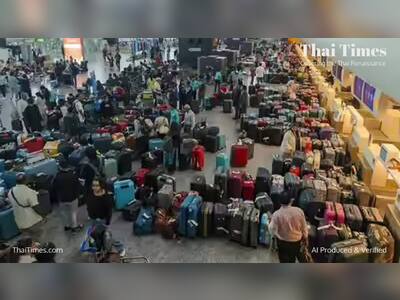Thailand Strengthens Oversight of Major E‑commerce Platforms
New regulations require 19 high-impact platforms to conduct risk assessments under DPS decree as online fraud and unsafe health products prompt coordinated action
The Thai government has escalated regulatory oversight of key digital commerce platforms following the publication of a Royal Gazette notification on July 9, which took effect on July 10.
Under the existing Digital Platform Services (DPS) royal decree, 19 designated “high-impact” platforms must comply with Section 20, mandating business risk assessments and the implementation of risk management measures.
This obligation applies to platforms that facilitate sales or advertisements of products subject to official standards and which, due to their scale or the nature of their operations, pose potential risks to economic stability, financial security and consumer trust in digital ecosystems.
Among the listed platforms are Shopee, Lazada, Grab, Kaidee, One2car, LINE Shopping, Alibaba, AliExpress, Taobao, Temu, NocNoc, eBay, SCG Home, OneSiam App, Thisshop, Rakmao, SIA E‑Auction, ReadyPlastic Auction and ROOTS Platform.
The list is subject to annual review .
The DPS decree requires affected platforms to evaluate systemic risks, enact preventative protocols, and implement remediation plans to address any consumer or public harm .
In parallel, the Electronic Transactions Development Agency (ETDA) has reaffirmed efforts to curb fraudulent and illegal online advertisements.
Last year, consumer losses from such schemes exceeded 19 billion baht.
A core initiative involves collaboration with the Food and Drug Administration (FDA), major e‑commerce platforms and LINE Shopping to deploy API‑based vetting systems.
These systems aim to block unauthorised health products from being sold or advertised online .
The FDA has partnered with Mahidol University’s Institute for Population and Social Research, King Mongkut’s University of Technology Thonburi’s Institute of Field Robotics, and the World Health Organization’s Thailand office to develop an AI‑powered system.
This technology is designed to detect advertisements for smuggled or unlabelled health products with higher efficiency .
These measures are part of a broader strategy to reinforce consumer protection in Thailand’s digital economy.
The ETDA also announced it will host a second workshop in July to assist platform operators with notification and compliance procedures under the DPS framework, in coordination with the Ministry of Digital Economy and Society and other agencies .
Data from ETDA’s 1212 Online Fraud and Complaint Centre revealed 35,358 online fraud reports in 2024, a 21.7% decrease from 45,190 cases in 2023.
The most common forms of complaint were online sale fraud (15,050 cases) and illegal websites including gambling and phishing sites (11,371 cases) .
In addition, Thailand’s Anti‑Online Scam Operation Center (AOC), established in 2023, continues active 24/7 operations using AI and big data.
The centre handles around 700 scam complaints daily, monitors illicit financial flows, and has facilitated the freezing of suspect accounts.
Between early 2023 and mid‑2024 it oversaw recoupment of more than 1.9 billion baht in blocked funds during January, recovering 56.7% of estimated losses for that month .
These combined regulatory, technological and enforcement efforts reflect a coordinated government approach aimed at enhancing safety and accountability across Thailand’s expanding e‑commerce and online services landscape.
Under the existing Digital Platform Services (DPS) royal decree, 19 designated “high-impact” platforms must comply with Section 20, mandating business risk assessments and the implementation of risk management measures.
This obligation applies to platforms that facilitate sales or advertisements of products subject to official standards and which, due to their scale or the nature of their operations, pose potential risks to economic stability, financial security and consumer trust in digital ecosystems.
Among the listed platforms are Shopee, Lazada, Grab, Kaidee, One2car, LINE Shopping, Alibaba, AliExpress, Taobao, Temu, NocNoc, eBay, SCG Home, OneSiam App, Thisshop, Rakmao, SIA E‑Auction, ReadyPlastic Auction and ROOTS Platform.
The list is subject to annual review .
The DPS decree requires affected platforms to evaluate systemic risks, enact preventative protocols, and implement remediation plans to address any consumer or public harm .
In parallel, the Electronic Transactions Development Agency (ETDA) has reaffirmed efforts to curb fraudulent and illegal online advertisements.
Last year, consumer losses from such schemes exceeded 19 billion baht.
A core initiative involves collaboration with the Food and Drug Administration (FDA), major e‑commerce platforms and LINE Shopping to deploy API‑based vetting systems.
These systems aim to block unauthorised health products from being sold or advertised online .
The FDA has partnered with Mahidol University’s Institute for Population and Social Research, King Mongkut’s University of Technology Thonburi’s Institute of Field Robotics, and the World Health Organization’s Thailand office to develop an AI‑powered system.
This technology is designed to detect advertisements for smuggled or unlabelled health products with higher efficiency .
These measures are part of a broader strategy to reinforce consumer protection in Thailand’s digital economy.
The ETDA also announced it will host a second workshop in July to assist platform operators with notification and compliance procedures under the DPS framework, in coordination with the Ministry of Digital Economy and Society and other agencies .
Data from ETDA’s 1212 Online Fraud and Complaint Centre revealed 35,358 online fraud reports in 2024, a 21.7% decrease from 45,190 cases in 2023.
The most common forms of complaint were online sale fraud (15,050 cases) and illegal websites including gambling and phishing sites (11,371 cases) .
In addition, Thailand’s Anti‑Online Scam Operation Center (AOC), established in 2023, continues active 24/7 operations using AI and big data.
The centre handles around 700 scam complaints daily, monitors illicit financial flows, and has facilitated the freezing of suspect accounts.
Between early 2023 and mid‑2024 it oversaw recoupment of more than 1.9 billion baht in blocked funds during January, recovering 56.7% of estimated losses for that month .
These combined regulatory, technological and enforcement efforts reflect a coordinated government approach aimed at enhancing safety and accountability across Thailand’s expanding e‑commerce and online services landscape.











